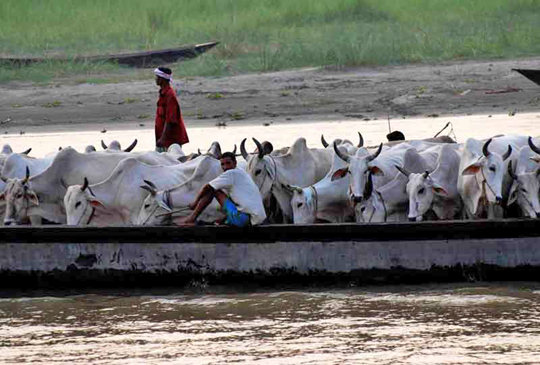Shillong, Jul 15: Cattle smuggled from India is harming the economy of Bangladesh, a senior officer of Border Guards of Bangladesh said today and formally requested the Border Security Force (BSF) to stop it.

"Actually it (cattle smuggling is harming our economy. If it doesn’t come from India then our dairy farmers can go up and we can take care of ourselves," BGB Region Commander Addl Director General Md Zahid Hasan told reporters here.
He said, "We have requested BSF to stop smuggling and a lot of other related issues can be resolved by that."
The BGB officer who attended the four-day BSF-BGB Border Coordination Conference here also admitted that cattle smuggling was one of the agendas of the conference.
Stating that cattle all by itself cannot walk across the border, Hasan said, "We have requested that such kind of smuggling be stopped because these cattle are coming from deep inside from within India and from West of India."
The BGB region commander and the Meghalaya frontier BSF IG P K Dubey also met Meghalaya's Director General of Police S B Singh and discussed on the issue of cattle smuggling and cross border crimes.
"Action plan has been drawn on intelligence sharing on real time basis on criminal activities on either side of the border, both the forces will promptly act," Hasan said.
The BGB commander has also raised the issue of firing by BSF personnel on Bangladesh nationals.
"There are few in our areas of concern which we have discussed. Some of the incidents categorically were brought before the discussion. We have discussed the issue and we have agreed on certain issues on that and hopefully that will come down to zero," he said.
The Meghalaya Frontier BSF IG P K Dubey said border related issues were discussed in details and efforts have been taken to curb trans-border crimes.
"Our main concerns were killing of innocent Bangladeshi nationals and smuggling of drugs, and also to find out the modalities to build our relationships," he said.
He also said, "We have expressed zero tolerance for smuggling of fire arms and explosives, human trafficking and drugs. We have agreed to enhance the confidence building measures between both the forces on the ground."
The BSF-BGB conference takes place twice a year and the last one was held in Sylhet in November.





Comments
Add new comment